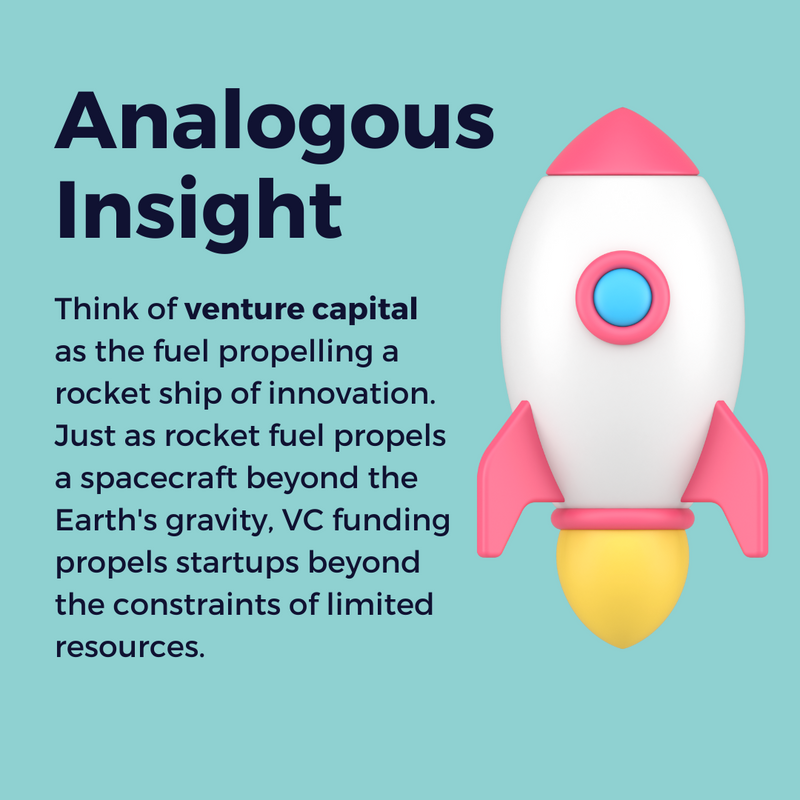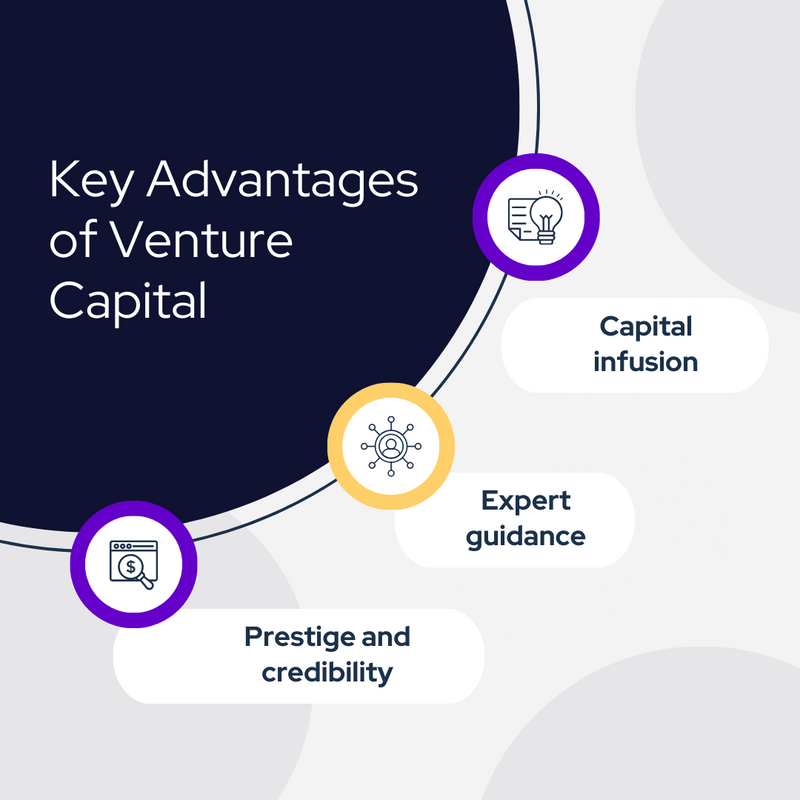What is Venture Capital?
Venture Capital (VC) is a form of private equity (PE) and a type of financing that investors provide to startup companies and small businesses that are believed to have long-term high growth potential. This type of investment does not have to be only financial, it can also be offered via technical or managerial expertise. The key difference between VC and PE investments is that a private equity firm's strategy is to buy mature companies that are already established. Whereas VCs give financing to new businesses that do not have access to stock markets and do not have enough cash flow to take on debts.

How Venture Capital Works
VC firms raise capital from limited partners - institutions like family offices, pension funds, endowments, foundations, insurance companies, as well as high net worth individuals.
Once a fund is raised, the VCs then invest the fund's capital into startup companies in exchange for a % of equity stakes, normally not more than 50%, since most prefer to spread out their risk and invest in many different companies. They source deals through startup incubators, accelerators, university tech transfer offices, angel investor networks, and inbound inquiries.
The VC firm conducts due diligence on potential investments including assessing the team, business model, addressable market, financial projections, and competitive landscape. If they decide to invest, the legal terms are negotiated including amount invested, valuation, liquidation preferences, governance, and more.
The optimal outcome is for the startup to either get acquired or go public at a substantial valuation multiple, allowing the VC to exit the investment with a large return.
Venture capitalists thus operate as fund managers - they pool limited partner capital into funds, invest in and support a portfolio of high growth potential companies, then exit these companies to realize returns and compensate their limited partners. It's a long term, high risk investment strategy but with potential for outsized returns.
Key Advantages of Venture Capital

Capital infusion:
Venture capital provides startups with the substantial capital needed to accelerate growth and rapidly scale operations. This growth capital is hard to access via traditional means.
Expert guidance:
Experienced VCs offer strategic advice, industry connections, and operational support to the leadership of startups they invest in. This can greatly increase the odds of success.
Prestige and credibility:
Gaining the backing of respected VCs lends legitimacy to young startups, helping attract talent, partners, and follow-on financing.
Notable Examples of Venture-Backed Startups
Facebook’s $22B acquisition of WhatsApp in 2014 was (and still is) the largest private acquisition of a VC-backed company ever. It was also a big win for Sequoia Capital, the company’s only venture investor, which turned its $60M investment into $3B.
Facebook’s $16B IPO at a massive $104B valuation was a huge success for early investors Accel Partners and Breyer Capital.
Stages of Venture Capital Funding
Pre-seed funding typically ranges from $10,000 to $150,000 and allows companies to put basic operations in place. The capital may be used to conduct initial market research, develop an MVP, set up legal structures, and handle other early logistical costs.
Investors include angel investors, friends and family, incubators, and increasingly venture capital firms themselves specializing in pre-seed and seed stage investing.
Once initial development is done, seed funding allows startups to advance their MVP into a formal product and commence commercialization efforts. Seed rounds range from $500,000 to $2 million on average.
The capital allows startups to further develop products, establish teams, identify product-market fit, scale initial operations and marketing. First office space and key hires may be funded at this stage.
Investors include angels, seed-stage VCs, equity crowdfunding, and accelerators. Seed investors get equity stakes, often around 10-25% ownership in exchange for capital.
Early stage VC comes in the form of Series A, B, and beyond rounds, once seed funding is exhausted and the business begins commercialization. Round sizes can range from $2 million to $50 million.
The capital allows businesses to expand operations, manufacturing, marketing initiatives, recruit key executives, and start realizing measurable traction and revenues from initial customers. Geographic expansion and M&A may also be funded.
Early stage VCs acquire stakes averaging 10-30%+ while providing hands-on strategic and operational guidance. Strong early traction can lead to increased valuations and ownership dilution for VCs in later rounds.
As startups progress toward maturity and profitability, larger late stage VC rounds become more widely available in the tens to hundreds of millions.
This capital allows companies to become market leaders and scale operations globally to meet growing demand. Funds can be used for everything from facilities to M&A activity.
Late stage VCs take smaller stakes as valuation multiples increase, often paying a premium for largely de-risked companies with substantial traction poised for imminent liquidity events. Their connections can pave the path to exits.
Types of Venture Capital
There are several types of firms that invest in startups including:
1) Angel Investors - Wealthy individuals who invest their own money in early stage startups. They often have industry experience and provide mentoring.
2) Micro VCs - Small venture capital firms focused on early stage investing - seed through Series A rounds. Typically manage funds under $100M.
3) Full Life Cycle VCs - Larger firms that invest in startups across all stages from seed through late stage and IPO. Manage multiple funds totaling hundreds of millions to billions.
4) Corporate VCs - The venture capital arms of large corporations that make strategic startup investments. Allows access to emerging tech and business models.
5) Super Angels - Prominent angel investors who lead syndicated seed deals by pooling capital from their extensive angel networks.
6) Accelerators - Time-limited programs like Y Combinator that offer mentoring, networking, and capital via demo days. Help launch startups.
7) Equity Crowdfunding - Platforms like SeedInvest that let groups of non-accredited investors combine capital in startups. Typically seed stage deals.
8) Sector-Specific VCs - Firms focused on single sectors like Healthcare, Fintech, Enterprise Software, etc. Build deep category expertise.
9) Stage-Specific VCs - Firms that specialize in particular funding stages - seed, early-stage, late-stage, pre-IPO rounds.
Conclusion:
While risky and involving ownership dilution, venture capital unlocks growth opportunities that simply are not possible through conventional means. The expertise and advice of experienced venture capitalists further increases the odds of startup success.
VCs spend an important amount of time exploring investment opportunities in the market, but also meeting potential investors for current or future fundraising needs. This can only happen by developing the right network. If you want to have access to the right people, attend our Zero One Hundred Conferences, a space to develop meaningful connections within the VC/PE ecosystem. Go to https://www.0100conferences.com/conferences to find the upcoming PE/VC conferences near you.


